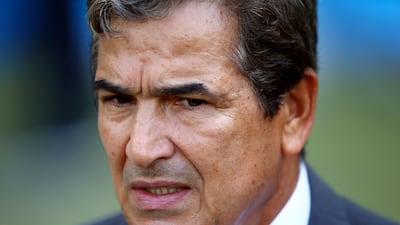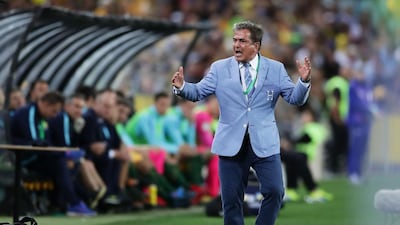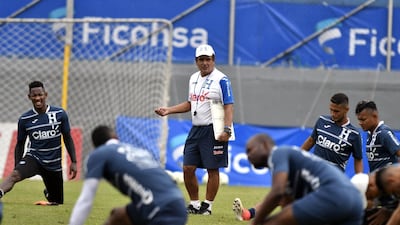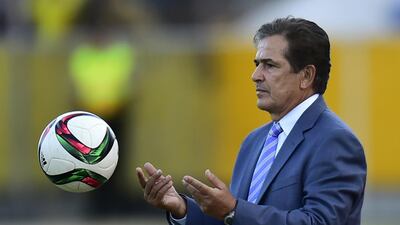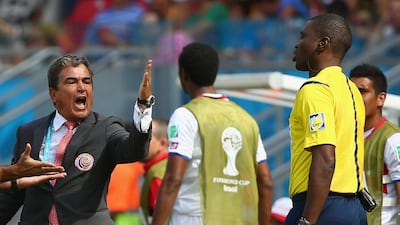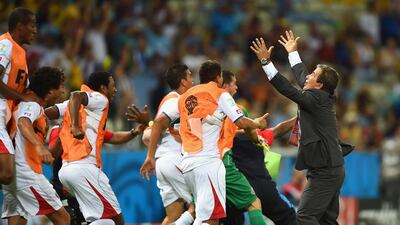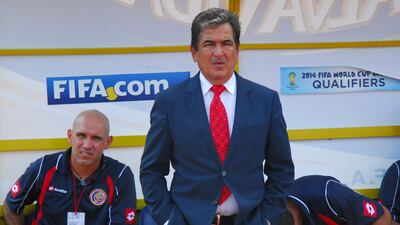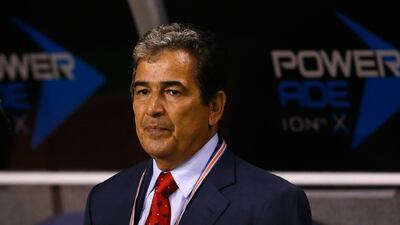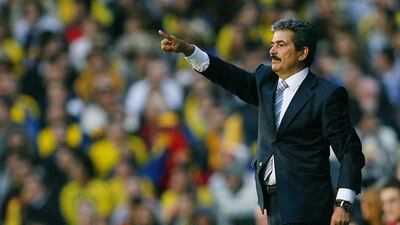The mission is clear: to get the UAE to the 2022 World Cup.
Jorge Luis Pinto, the man assigned the task, is an intense 67-year-old Colombian who built his career from a follower to a World Cup hero through an unwavering devotion to football.
The new UAE manager landed in the UAE this week and will take the reins of a national team in fourth place in the Asian second qualifying round, behind Vietnam, but with one match in hand.
Trying to get the UAE to their second World Cup ever, Pinto will assess the needs and facilities, and then take the team to Austria for a training trip. The squad meet tonight in Al Ain for a six-day camp.
It is the fourth national team Pinto leads, and the first time he has taken an assignment outside of Latin America. His calling card: leading Costa Rica from Brazil 2014 World Cup underdogs to head a group including Italy, England and Uruguay. They only went out in the quarter-finals after a penalty shootout against the Netherlands.
Pinto's reputation may now be international, but the Emirates are new horizons for the Colombian from the Santander region.
"I imagine a modern country, where religion is important; a peaceful place, with commitment, discipline," he said just before arriving. "Everybody now knows about the Emirates and its great economy and culture. A leader in technology with a culture of winning.
"All they need is to take the next step in football, to be a protagonist, and show their quality on the world stage in football, make a mark and be seen around the world. I think they will see the results on the field, as I will."
During the pandemic, Pinto watched UAE's qualifying matches, adding, "I like what I see in the players. A technical team, that's missing a couple of details.
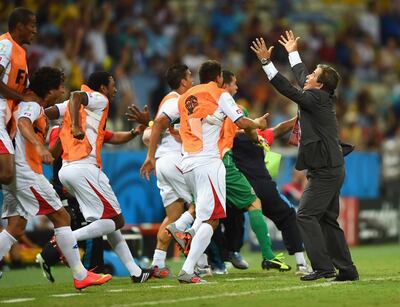
"One advantage is the players all play locally. They treat the ball well and I liked that. The [Gulf] is a different culture, a different country. But the tactical aspects of the game are the same, and allows me to dream of doing great work."
The man taking over The Whites is known as a strict disciplinarian with thorough preparation, who seeks to right the ship until reaching Qatar 2022. He takes over from Ivan Jovanovic, who was dismissed in April without taking charge of a match after being hired to replace Dutchman Bert van Marwik, "They will adapt quickly, as will I," he says.
"The [federation] have told me whatever I need will be provided. I told them we will undertake a scientific preparation, from physiology to methodology. As a coach I need to judge players well. Then, I have to prepare myself so we can prepare a team. And have leadership. But when players realise that their coach knows what he's doing, they progress. Some will like it, some won't."
After a triumphant return to Costa Rica in 2014, Pinto did not continue in his role, he says, because their federation did not live up to their agreement.

"After the World Cup draw, we talked about performance bonuses in Brazil 2014. I put numbers on paper, all the way to a World Cup final. They laughed then, but we were one penalty away from reaching the semis. So it wasn't unrealistic."
Among coaches, Pinto admired Rinus Michels of the Netherlands, Ukraine's Valeri Lobanovski, Ernst Happel of Austria and England's Bobby Robson. His mentors were Gabriel Ochoa Uribe of Colombia and Brazil's Ayrton Brandao.
He travelled to watch and learn, and recalls how he spent 45 days in Kiev observing Lobanovski's methods after seeing his Dynamo Kiev team and the USSR impress in Mexico 86.
Travelling on his own money, Pinto was also at Italia 90, when UAE played Colombia, losing 2-0. "Of course I saw it. I was in the stadium," he said.
"It was historic for the UAE. They were the best from the region. I think those experiences have to be in the memory, and I hope this generation can repeat."
Pinto likes a hybrid style of football: the talent and skill of South Americans, the tactical acumen of Italy, the running of Germans, and the aggressiveness of the English. However, the rigid discipline and physical preparation requires sacrifice and focus from players.
His tactical concepts are not rocket science. But when applied correctly, they have yielded results: playing out of the back, pressing as a block to recover the ball. Pinto's favourite tactical formation is a 5-4-1, which he says was first used in the World Cup by Costa Rica in 2014.
The system - apart from requiring wing backs that attack and defend - requires players with the versatility of performing in three different positions according to the match situations.
Present at World Cups since 1978, Pinto watches formations not apparent on TV, mixes with managers and peppers them with questions.
The Colombian has had repeated run-ins with the press and detractors, but considers group cohesion important.
"I think I am honest and fair in my decisions," he says. "They can think whatever they want of me, but I don't play favourites. I'm not doing anybody favours and won't be pressured by outsiders. You are my players, and I will make decisions with my players in mind, and nobody else."
In a recent interview on Colombian radio, Pinto revealed that the only Tico players that did not adapt to his discipline were Bryan Ruiz and Keylor Navas.
Ruiz, former Sporting Lisbon and Fulham midfielder, at times clashed with Pinto, but said, "When it comes to tactics, Pinto is the best I've worked with."

"Sometimes people get the wrong idea and think I'm unreasonably demanding," Pinto adds. "Maybe, but most players thank me. That has touched me and reinforces my coaching philosophy.
"But there's a reason I want something at a certain moment from a player. Some may not like the workload. That's normal in businesses, or groups. Football players know right away if they can fool a coach."
If the objective is to get a team to perform, Pinto may be the man. His last role was with Colombian club Millonarios, and before that with Honduras, who fell short of reaching Russia 2018 after losing a two-leg playoff to Australia. He also managed the Colombia national team in a long career.
Now, his optimism is palpable.
"I'm in the best momento of my career. My life experience, all I've seen and learnt. We change and correct things, especially if you're a thinker. The most important thing is the fundamentals."
Available to Pinto will be the naturalised players Sebastian Tagliabue, and Brazilians Caio Canedo and Fabio De Lima. "Even the powers of the sport [naturalise] - Italy, Spain, Portugal," he notes. "If you want to win, and qualify, it's something one has to take into account if it helps."
